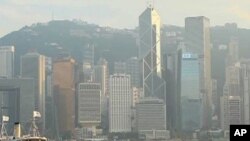HONG KONG - Democratic legislators in Hong Kong are attempting to block a proposed amendment to a local law that would prevent politicians from running for re-election less than six months after resigning from their seat in the city’s legislature. The Democrats’ filibustering is angering the pro-Beijing government.
Resigning from the legislature then seeking immediate re-election sounds counter-intuitive. However, in 2010, five Hong Kong democrats used just such a strategy to protest the slow pace of democratization in this special administrative region of China, which enjoys considerable political autonomy from Beijing.
The re-election campaign run by the five Democrats was seen as a de facto referendum on the government’s lack of commitment to universal suffrage, in a city where referenda are not sanctioned in law. By seeking to amend the legislation, the government is attempting to restrict political freedoms says Alan Leong, leader of the pro-democracy Civic Party and one of those to resign in 2010.
“In the current legislative council, where half of the council is not returned by universal suffrage, the government can really bulldoze through the most unfair legislation. So, at the end of the day, if the government is determined to pass this unjust piece of legislation, it will do so,” Leong said.
In an effort to delay the government’s proposed amendment until at least the autumn legislative session, filibustering pan-Democrats have proposed more than 1,300 amendments to the electoral bill.
Democrats have found a variety of creative ways to use up precious legislative time in discussing their proposed amendments. The Bible and classical Chinese texts have been widely referenced. Legislator Raymond Wong even mimicked the slow speaking style of Chinese Premier Wen Jiabao.
Meanwhile, pro-Beijing legislators - whose presence is necessary to ensure a quorum on the government side - were seen painting, writing poetry and exercising in the chamber to pass the hours.
Health Secretary York Chow told local media the Democrats’ actions would have little impact on the final form of the legislation.
“Of course they have the right. But … this type of behavior is unreasonable. You can do [this] every time. And, if you did, the whole legislature would be obstructed to a standstill,” Chow said.
The filibuster is an embarrassment for Donald Tsang, the increasingly unpopular head of the Hong Kong government. Tsang leaves office in July and hoped to pass several pieces of legislation before his retirement. Leong has little sympathy.
“This impasse is really of the government’s own making. The Civic Party proposed an adjournment motion which would give the government a way out, but the government and pro-government camp voted down this motion,” Leong said.
The filibuster also causes a headache for Tsang’s successor, Leung Chun-ying. The next, Beijing-sanctioned leader of Hong Kong intended to seek legislative approval of a proposed reorganization of government departments before June, to facilitate his transition into office. With the filibuster ongoing, this is looking less and less likely.
Resigning from the legislature then seeking immediate re-election sounds counter-intuitive. However, in 2010, five Hong Kong democrats used just such a strategy to protest the slow pace of democratization in this special administrative region of China, which enjoys considerable political autonomy from Beijing.
The re-election campaign run by the five Democrats was seen as a de facto referendum on the government’s lack of commitment to universal suffrage, in a city where referenda are not sanctioned in law. By seeking to amend the legislation, the government is attempting to restrict political freedoms says Alan Leong, leader of the pro-democracy Civic Party and one of those to resign in 2010.
“In the current legislative council, where half of the council is not returned by universal suffrage, the government can really bulldoze through the most unfair legislation. So, at the end of the day, if the government is determined to pass this unjust piece of legislation, it will do so,” Leong said.
In an effort to delay the government’s proposed amendment until at least the autumn legislative session, filibustering pan-Democrats have proposed more than 1,300 amendments to the electoral bill.
Democrats have found a variety of creative ways to use up precious legislative time in discussing their proposed amendments. The Bible and classical Chinese texts have been widely referenced. Legislator Raymond Wong even mimicked the slow speaking style of Chinese Premier Wen Jiabao.
Meanwhile, pro-Beijing legislators - whose presence is necessary to ensure a quorum on the government side - were seen painting, writing poetry and exercising in the chamber to pass the hours.
Health Secretary York Chow told local media the Democrats’ actions would have little impact on the final form of the legislation.
“Of course they have the right. But … this type of behavior is unreasonable. You can do [this] every time. And, if you did, the whole legislature would be obstructed to a standstill,” Chow said.
The filibuster is an embarrassment for Donald Tsang, the increasingly unpopular head of the Hong Kong government. Tsang leaves office in July and hoped to pass several pieces of legislation before his retirement. Leong has little sympathy.
“This impasse is really of the government’s own making. The Civic Party proposed an adjournment motion which would give the government a way out, but the government and pro-government camp voted down this motion,” Leong said.
The filibuster also causes a headache for Tsang’s successor, Leung Chun-ying. The next, Beijing-sanctioned leader of Hong Kong intended to seek legislative approval of a proposed reorganization of government departments before June, to facilitate his transition into office. With the filibuster ongoing, this is looking less and less likely.




